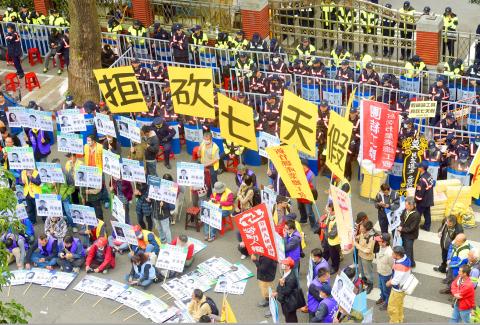Labor campaigners yesterday rallied outside the Legislative Yuan building to protest against proposed amendments to the Labor Standards Act (勞動基準法), demanding that lawmakers scrap the amendments, which they said would institutionalize inferior working conditions prevalent in the nation.
More than 100 protesters from the Workers’ Struggle Alliance, Taoyuan Confederation of Trade Unions and the Trade Union of Electrical, Electronic and Information Workers in Taiwan gathered outside the Legislative Yuan, criticizing what they called the Democratic Progressive Party’s (DPP) attempt to force the amendments through the legislature.
The proposed amendments seek to scrap seven national holidays and implement “one flexible rest day and one fixed day off” to accommodate a 40-hour workweek bill passed last year.

Photo: Huang Yao-cheng, Taipei Times
Following news that the legislature was to vote on the amendments after the DPP caucus resumed a floor meeting brought to a halt by Chinese Nationalist Party (KMT) lawmakers, protesters threw smoke grenades into the premises of the Legislative Yuan and burned joss paper outside its gates.
“The DPP has become a different party after the elections. Before the elections, to garner our support the DPP promised that it would not axe the seven holidays, but after it won the elections, the party rears its ugly head just like the KMT,” Hsinchu Confederation of Trade Unions director Chan Su-chen (詹素貞) said.
Many of the protesters had previously worked with the DPP on social issues, but “the DPP turned into another KMT” once it assumed power, Taoyuan Confederation of Trade Unions director Mao Chen-fei (毛振飛) said.
Protesters held placards bearing the pictures of DPP lawmakers, describing them as “holiday killers.”
“Follow the will of the public. Go against the party’s will. Do not kill the holidays,” protesters chanted, urging DPP lawmakers to act on personal values instead of as a rubber stamp for the party.
DPP Legislator Lin Shu-fen (林淑芬) is the only DPP lawmaker who sided with the protesters and she is to receive disciplinary action for refusing to attend yesterday’s legislative meeting, alliance member Lu Chyi-horng (盧其宏) said.
“President Tsai Ing-wen (蔡英文) said labor rights was where she was the most vulnerable, but what we see is the government’s plan to slash seven holidays,” Lu said.
One of Tsai’s campaign pledges was to reduce working hours and implement a five-day workweek, but the DPP administration’s “rest day” policy could not serve to reduce working hours, as employees could be forced to work on “rest days,” while the number of national holidays would be cut from 19 to 12, alliance member Kuo Kuan-chun (郭冠均) said.
About 53 percent of the public said it did not support the cancelation of seven national holidays and only 35 percent said they accepted the cancelation, Kuo said.
A hunger strike is being held because the amendments are the only labor law revision in 16 years, but the DPP seeks to create a loophole for employers to exploit workers with the “rest day” policy, protesters said.

Trips for more than 100,000 international and domestic air travelers could be disrupted as China launches a military exercise around Taiwan today, Taiwan’s Civil Aviation Administration (CAA) said yesterday. The exercise could affect nearly 900 flights scheduled to enter the Taipei Flight Information Region (FIR) during the exercise window, it added. A notice issued by the Chinese Civil Aviation Administration showed there would be seven temporary zones around the Taiwan Strait which would be used for live-fire exercises, lasting from 8am to 6pm today. All aircraft are prohibited from entering during exercise, it says. Taipei FIR has 14 international air routes and

Taiwan lacks effective and cost-efficient armaments to intercept rockets, making the planned “T-Dome” interception system necessary, two experts said on Tuesday. The concerns were raised after China’s military fired two waves of rockets during live-fire drills around Taiwan on Tuesday, part of two-day exercises code-named “Justice Mission 2025.” The first wave involved 17 rockets launched at 9am from Pingtan in China’s Fujian Province, according to Lieutenant General Hsieh Jih-sheng (謝日升) of the Office of the Deputy Chief of the General Staff for Intelligence at the Ministry of National Defense. Those rockets landed 70 nautical miles (129.6km) northeast of Keelung without flying over Taiwan,

The Ministry of National Defense (MND) today released images of the military tracking China’s People's Liberation Army (PLA) movements during the latest round of Chinese drills around Taiwan. The PLA began "Justice Mission 2025" drills today, carrying out live-fire drills, simulated strikes on land and maritime targets, and exercises to blockade the nation's main ports. The exercises are to continue tomorrow, with the PLA announcing sea and air space restrictions for five zones around Taiwan for 10 hours starting from 8:30am. The ministry today released images showing a Chinese J-16 fighter jet tracked by a F-16V Block 20 jet and the

City buses in Taipei and New Taipei City, as well as the Taipei MRT, would on Saturday begin accepting QR code payments from five electronic payment providers, the Taipei Department of Transportation said yesterday. The new option would allow passengers to use the “transportation QR code” feature from EasyWallet, iPass Money, iCash Pay, Jkopay or PXPay Plus. Passengers should open their preferred electronic payment app, select the “transportation code” — not the regular payment code — unlock it, and scan the code at ticket readers or gates, General Planning Division Director-General Liu Kuo-chu (劉國著) said. People should move through the